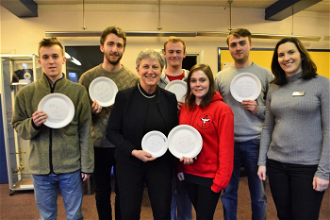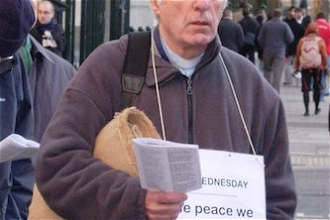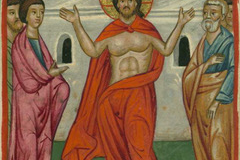Birmingham: Christian students discuss End Hunger Campaign with Gisela Stuart MP

Students from the University of Birmingham's Catholic and Methodist societies have met with Gisela Stuart, Labour MP for Birmingham Edgbaston, to discuss the End Hunger UK campaign. They discussed the nature and causes of food poverty, the role of the political system, and the part played by ordinary citizens in bringing about change. The group also presented a collection of paper plates to Ms Stuart, with suggestions from members of the societies about how to tackle food poverty.
One of the key issues that emerged from the discussion was how citizens and politicians could work together. Parliament can bring attention to these issues, but only with "the individual cases that demonstrate the problem and give a chance for reform," said Ms Stuart. "So if you come across these stories, that is really important." At the same time, she said, public pressure and community action can make a huge difference: "School meals were changed after criticism from Jamie Oliver. Similarly, the churches still have a massive part to play, especially when they work together with other faith leaders."
In recent weeks, the Birmingham societies have engaged actively in the End Hunger UK campaign, which aims to end food poverty in the UK by bringing ordinary citizens, local community groups, churches and politicians together. In January, members of the Birmingham Methodist and Catholic societies arranged a film night to watch I, Daniel Blake, the latest film by director Ken Loach, which depicts the life of someone struggling to make ends meet while navigating the complex world of the UK benefits system.
Bill Dallman, a student at the University of Birmingham and President of the Catholic Society said: "It was great to meet Gisela, and I liked how she challenged us to tackle the issues we raised head on. Yes, politics is about Parliament and legislation, but it's also about people. We were encouraged to think about how we can deal with these problems in our own communities - here at university for example. We don't need to wait for some lengthy decision making process at Westminster for the End Hunger campaign to be a success. I'm excited to see where the campaign will take us next - working towards ending hunger and ultimately bringing the joy of Christ into the lives of those that we meet along the way."
One of the issues to emerge during the discussion was food waste. The group discussed the possibility of creating a tax incentive that would make the redistribution of surplus food compulsory for large food retailers. The idea comes from a French law passed in 2016, which forces large supermarkets to pass on unsold food to charities and food banks. Ms Stuart is to raise the idea with the Treasury and Department for Environment, Food & Rural Affairs.
"France's measures to tackle food waste showed what can happen when campaigners and ordinary citizens work with the political system to create change," said Ruth Wilde, SCM's Faith in Action worker. "By starting this conversation now, we hope that political pressure, combined with grassroots campaigning, will mean Britain can also become a leader in the fight against hunger and food waste."
In 2015, members of Birmingham Methodist Society established a food exchange programme, with the help of SCM's Faith in Action intern Stephen Atkinson. The project collects surplus food from outlets on campus, redistributing it to a local homeless charity.
For Mark Birkett, a second-year student and member of Birmingham MethSoc, giving food to people who needed it was only a start. More needed to be done to fix long-term endemic problems: "Last year I went out with Birmingham Homeless Outreach to help with their distribution of food and clothing for the homeless. What struck me was that we weren't necessarily very satisfied by giving people food. What can we really give people that can make a difference? Going back to the film I, Daniel Blake, it's dignity, self-respect. I think that's a big issue that needs to be linked to homelessness and hunger. We need to build these people up and give them a sense of meaning and respect."
We ended the discussion with a challenge for the students to reach out to other societies on campus - faith-based or secular - and put pressure on the university to do more to tackle the issue of food waste.
Philippa Jefferies, President of the University of Birmingham's Methodist Society, added: "Food waste in the UK is a huge problem and something MethSoc has aimed to help reduce, one example being through our current food exchange scheme. Our discussion with Gisela Stuart helped us to think bigger and on a more university scale. We can have a lot of power to get the government's attention on this issue if we focus on uniting and including more people. Following on from the discussion we aim to get more groups within the university involved with what we do."
Read more about the End Hunger UK campaign here: http://endhungeruk.org/


















